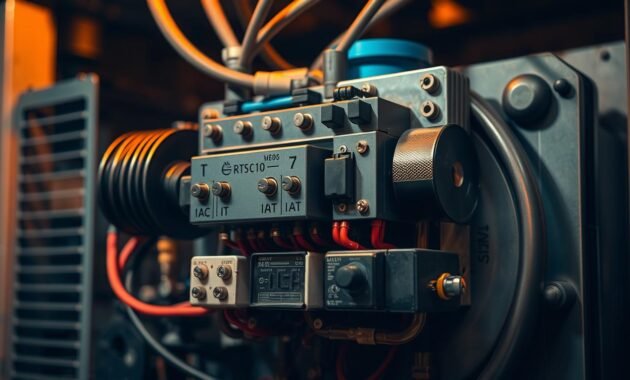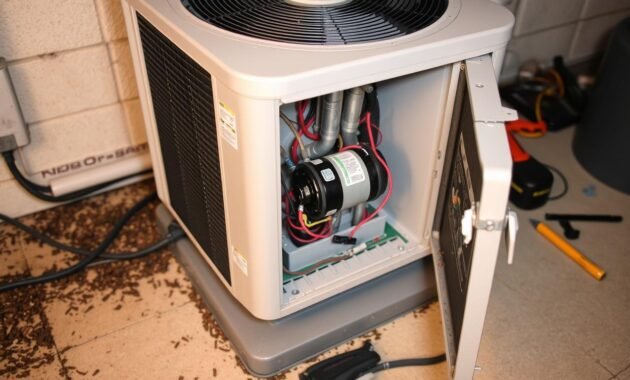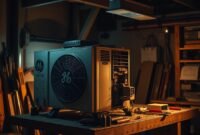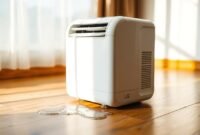Are you tired of your AC tripping the breaker every time it runs? When your air conditioner keeps tripping the breaker after 5 minutes, it’s a big problem. It means something is seriously wrong with your cooling system.
The constant start and stop can damage your AC. It leaves you sweating and uncomfortable. I’ve seen many homeowners deal with this issue. I’m here to help you find and fix the problem before it costs too much.
Read also: Portable Air Conditioner Compressor Keeps Shutting Off
In this guide, we’ll look at why your AC trips the breaker after 5 minutes. We’ll also give you practical solutions to fix it. We’ll cover electrical and mechanical issues. You’ll learn how to control your home’s comfort.

Understanding Your AC Circuit Breaker System
Your home’s electrical system depends on circuit breakers for safety. I’ll explain how these components protect your home from electrical dangers. Circuit breakers watch over your electrical flow, stopping dangerous overloads that could harm your wiring or start fires.
Protecting Your Home’s Electrical Safety
Circuit breakers cut off electrical current when something goes wrong. They can trip many times, depending on the situation. Usually, a breaker can trip several times before needing to be replaced. If a circuit breaker trips after a few hours, it often means there’s an electrical issue that needs to be looked into.
Circuit Breaker Varieties
- Standard Single-Pole Breakers
- Double-Pole Breakers
- GFCI (Ground Fault Circuit Interrupter) Breakers
- AFCI (Arc Fault Circuit Interrupter) Breakers
Identifying Normal vs. Abnormal Breaking
| Type of Circuit Breaking | Characteristics | Action Required |
|---|---|---|
| Normal Breaking | Occasional trips during high electrical load | Reset breaker, monitor system |
| Abnormal Breaking | Frequent trips, immediate re-tripping | Professional electrical inspection |
Knowing how many times a breaker can trip helps spot electrical system problems. If your circuit breaker trips often or after a few hours, it’s important to find out why. Some problems might be easy to fix, like overloaded circuits. But others could be serious and need a pro to check.
Common Reasons Why AC Trips Breaker After 5 Minutes
When your AC trips the breaker after 5 minutes, it’s a sign of a big problem. Knowing why it happens can help avoid expensive fixes and sudden breakdowns.
There are a few main reasons why your AC might trip the breaker fast. Let’s look at the top reasons that could be making your home uncomfortable:
- Electrical Overload: Your AC might draw too much current, overwhelming the circuit’s capacity
- Dirty Air Filters: Restricted airflow forces the system to work harder, increasing electrical demand
- Failing Compressor: A malfunctioning compressor can cause sudden electrical spikes
- Refrigerant Issues: Low refrigerant levels create additional strain on the system
Most of the time, electrical issues are the main cause. Problems like short circuits, loose connections, or damaged wiring can shut down the circuit breaker right away. These problems need quick help from a pro to avoid fires.
First, check your air filter and keep it clean. If the issue doesn’t go away, call a certified HVAC tech. They can find and fix the real problem, whether it’s electrical or mechanical.
Dirty Air Filters and Their Impact on Circuit Breaking
When trying to stop your AC from tripping the breaker, air filters are key. Many homeowners miss this important detail. A dirty air filter puts a lot of stress on your AC system, causing electrical issues.
Dirty air filters make your AC work harder to cool the air. This extra effort can lead to electrical problems. These problems can make your circuit breaker trip.
Signs of a Critically Dirty Filter
- Reduced airflow from vents
- Visible dust and debris accumulation
- Unusual system noises
- Increased energy bills
- Frequent system cycling
How to Check and Replace Air Filters
I suggest checking your air filters every month. Replace them every 60-90 days. If you have pets or a lot of dust, change them more often to avoid breaker trips.
Maintenance Schedule for Air Filters
- Monthly visual inspection
- Replace standard filters every 90 days
- Replace high-efficiency filters every 6-12 months
- Check filter condition during seasonal HVAC maintenance
Clean air filters prevent breaker trips and improve your system’s efficiency. They also help your AC last longer. A simple filter change can save you from expensive repairs and breakdowns.
Compressor-Related Issues That Trigger Breaker Trips

Your air conditioning system’s compressor can cause unexpected circuit breaker trips. A grounded compressor is a serious electrical issue that can stop your home’s cooling. When electrical connections are bad, the risk of breaker tripping goes up a lot.
Read also: The Air Conditioner Buzzing When Off
Compressor problems show up in several important ways:
- Unusual clicking or buzzing sounds from the AC unit
- Intermittent cooling performance
- Electrical burning smell near the compressor
- Visible signs of electrical wear or damage
A grounded compressor creates an abnormal electrical path. This can ignite the oil in the system. The circuit breaker trips to protect your home. Electrical shorts near the compressor can cause a lot of heat, damaging your air conditioning system.
Getting a professional diagnosis is key when you think there’s an electrical issue with your compressor. I suggest calling a certified HVAC technician. They can do detailed electrical tests and find the cause of the breaker trips.
Signs that your compressor might be failing include:
- Frequent circuit breaker tripping
- Inconsistent cooling performance
- Increased electrical consumption
- Unusual mechanical noises during operation
Knowing these signs can help you fix compressor problems early. This can prevent more expensive repairs or a complete system failure.
The Role of Refrigerant Levels in Circuit Breaking
Your air conditioning system needs refrigerant to cool your home. If refrigerant levels drop, it can cause big problems. This might make your AC trip the breaker after a few hours. It’s important to know how refrigerant affects your AC’s performance to avoid breakdowns.
Refrigerant is key to your cooling system. Low levels make your AC work too hard. This uses more power and can trip the circuit breaker.
Identifying Low Refrigerant Warning Signs
- Reduced cooling performance
- Ice formation on evaporator coils
- Unusual hissing sounds near refrigerant lines
- Higher than normal energy bills
- Warm air blowing from vents
Professional Refrigerant Management
Handling refrigerant needs special skills. Certified HVAC technicians can find and fix problems. They prevent your AC from tripping the breaker.
| Refrigerant Check Frequency | Recommended Action |
|---|---|
| Annual Inspection | Complete system refrigerant level check |
| Signs of Low Refrigerant | Immediate professional assessment |
| After Major Repairs | Verify refrigerant charge levels |
Regular maintenance can save you money and prevent AC failures. Always get a professional HVAC technician for refrigerant issues.
Electrical Wiring Problems and Short Circuits
When your RV AC trips breaker after 5 minutes, electrical wiring problems might be the cause. Faulty electrical connections can be dangerous. They can also affect your air conditioning system’s performance and safety.
Electrical issues in RV air conditioners come from a few main sources:
- Loose electrical connections
- Damaged wire insulation
- Corroded terminal points
- Incorrect wire gauge
Short circuits are a big risk for RV AC systems. These problems happen when current finds the wrong path. This leads to too much heat and trips the breaker. Traveling can make wiring problems worse in RVs.
| Wiring Issue | Potential Consequences | Recommended Action |
|---|---|---|
| Loose Connections | Intermittent Power, Arcing | Professional Inspection |
| Wire Damage | Increased Resistance, Overheating | Replace Damaged Wiring |
| Incorrect Wiring | System Malfunction | Rewiring by Certified Technician |
I suggest getting a professional electrician to check your RV AC’s electrical system every year. They can find problems early. This ensures your air conditioning works safely and well.
Overloaded Circuits and Power Distribution Issues
Learning how to stop your AC from tripping the breaker starts with understanding power distribution problems at home. Electrical systems can get too busy, leading to frequent breaker trips. This can ruin your comfort and even harm your air conditioner.
When I look into why an AC keeps tripping the breaker, I find that power load is key. Circuit breakers are set up to protect your home by cutting off power when it gets too high.
Calculating Your AC’s Power Requirements
To figure out how to stop your AC from tripping the breaker, you need to know its power load. Here’s a simple way to do it:
- Check your AC unit’s voltage and amperage specs
- Make sure your home’s circuit breaker can handle it
- See if your AC’s electrical needs match your circuit’s capacity
Effective Power Distribution Solutions
Stopping breaker trips means managing your home’s electricity well. Here are some good ideas:
- Get a special circuit just for your air conditioner
- Upgrade your electrical panel to meet higher power needs
- Spread out big power users on different circuits
Professional electricians can check and improve your home’s electrical setup. They make sure your AC runs smoothly without sudden stops.
When to Install a Hard Start Kit for Your AC

Many homeowners face AC issues that a hard start kit can fix. This small device is a big help for older AC systems that start up hard.
A hard start kit eases the power surge when your AC starts. This is key for older units or those with aging compressors. It helps avoid circuit breaker trips and damage to your system.
- Identify signs you need to install a hard start kit:
- Frequent circuit breaker tripping
- Compressor struggles to start
- Older AC unit (10+ years)
- Inconsistent cooling performance
Installing a hard start kit gives your AC’s compressor extra support at startup. This reduces strain on your system. It can also make your AC last longer and use less energy.
| AC System Condition | Hard Start Kit Recommendation |
|---|---|
| New AC Unit (0-5 years) | Not typically necessary |
| Older AC Unit (6-15 years) | Strongly recommended |
| Frequent Breaker Trips | Immediate installation suggested |
It’s wise to talk to a professional HVAC technician before getting a hard start kit. They can check your AC and give advice on if it’s right for you.
Professional Repairs vs DIY Solutions
It’s easy to want to fix your AC yourself when it keeps tripping the breaker. While some simple tasks can help, getting a pro is usually the best choice.
- Cleaning or replacing air filters
- Clearing debris around the outdoor unit
- Checking for obvious obstructions
- Verifying thermostat settings
But, electrical work is risky. Trying to fix complex electrical issues without training can cause:
- Personal injury
- Potential electrical fires
- Voiding equipment warranties
- Costly system damage
Professional HVAC technicians have the skills to find and fix AC problems. They can handle issues like:
- Electrical wiring problems
- Compressor malfunctions
- Refrigerant level imbalances
- Circuit overload conditions
Getting a professional might cost more at first. But, it can save you money by avoiding bigger problems and keeping your AC running right.
Conclusion
When your AC trips the breaker after 5 minutes, it’s important to find out why. We’ve looked into several reasons for this problem. Dirty air filters and compressor issues are just a few examples.
Why does your AC keep tripping the breaker? It’s not always easy to say. Issues like electrical wiring, refrigerant problems, and overloaded circuits can cause it. It’s best to get help from a pro to fix it right.
Regular maintenance is key to avoiding AC breaker problems. Getting your AC checked by a certified technician every year can help. This way, you can catch problems early and keep your AC running longer.
Remember, safety comes first. If your AC keeps tripping the breaker, call a qualified technician right away. They can do a thorough check and fix it, keeping your home cool and your electrical system safe.


